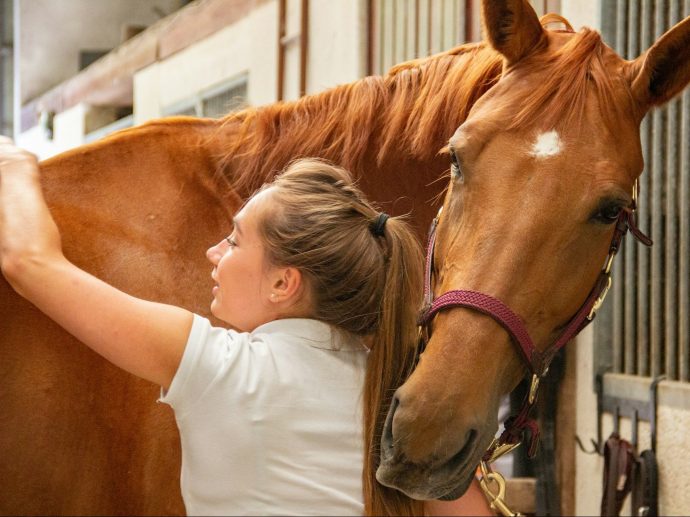Categories more
- Adventures (17)
- Arts / Collectables (15)
- Automotive (37)
- Aviation (11)
- Bath, Body, & Health (77)
- Children (6)
- Cigars / Spirits (32)
- Cuisine (16)
- Design/Architecture (22)
- Electronics (13)
- Entertainment (4)
- Event Planning (5)
- Fashion (46)
- Finance (9)
- Gifts / Misc (6)
- Home Decor (45)
- Jewelry (41)
- Pets (3)
- Philanthropy (1)
- Real Estate (16)
- Services (23)
- Sports / Golf (14)
- Vacation / Travel (60)
- Watches / Pens (15)
- Wines / Vines (24)
- Yachting / Boating (17)
Caring for Your First Horse: Beginner Tips to Keep Your Equine Happy and Healthy
Published
09/28/2024Having a horse is quite an enriching experience; however, it also entails several duties. For those venturing into horseback riding for the first time or are new to the equestrian scene, understanding how to properly care for your horse is vital in ensuring its well-being and longevity. Here is a novice-friendly handbook to assist you in grasping the fundamentals of caring for horses.
Caring for Your Horses Fundamental Requirements
Raising horses can be intricate as their requirements differ based on breed, maturity, and activity level. All equines typically need a balanced diet, daily physical activity, and medical attention. Establishing a habitat is essential for proper horse care to shield them from harsh weather conditions. This could involve providing them with a structure or a well-built shelter where they can seek refuge.
Caring for Your Horse Diet Properly
Taking care of your horse involves more than providing food—it's also about ensuring the quality of what you feed them matters as much as the quantity! Horses typically thrive best when their diet includes forage like grass and hay that's clean, mold-free, and suits their specific nutritional requirements well. Along with hay as a food choice for horses, grains or concentrated feeds may be necessary to give them an extra energy boost—especially if they regularly engage in intense activities such as riding or other equine sports. For the nutrition possible for your horse companion, consider checking out what's available at a place like Ponease, where you can find a range of supplements specially designed to meet your equine friend’s needs.
The Significance of Consistent Physical Activity
Ensuring your horse stays healthy is crucial. Exercise plays a key role in achieving that goal. It assists in managing their weight while also enhancing muscle strength and lowering the chances of colic, a prevalent digestive issue among horses. Engaging in rides or lunges and giving your horse the freedom to roam in a fenced-off paddock are great methods to promote their activity levels.
Regular Health Immunizations
Taking care of horses is crucial to their well-being, and health maintenance is essential to prevent any issues from arising in the future. Regular checkups by a vet can help identify health problems early. Vaccinations, deworming, and regular dental care also play a role in keeping horses healthy. It is important to monitor your horse closely for any signs of sickness or discomfort.
The Art of Grooming Goes Beyond Looks
Taking care of a horse involves grooming, which is important for both the horse and the owner. Brushing the horse's coat to maintain shine and promote skin circulation helps check the animal’s body for injuries and parasites while also fostering a bond of trust.
Maintaining Healthy Hooves for Horses
The age-old adage "No hoof means no horse" emphasizes the significance of maintaining hoof health through regular trimming and potential shoeing by a skilled farrier every 6 to 8 weeks. It is crucial to prevent issues such as lameness and severe conditions, like hoof rot, from arising.
Exploring the Behavior of Horses
Knowing how to interpret and react effectively to your horse’s actions is essential for nurturing a bond with them. Horses express themselves through their body movements, and being able to decipher these subtle cues enables you to foresee their requirements and avoid potential mishaps or behavioral challenges.
Practicing Safe Handling and Riding Techniques
Interacting with and riding your horse safely should always be your concern. Approach your horse with a sense of calm and confidence while ensuring all equipment is fitted correctly and in shape. While riding your horse, wear safety gear like a helmet and always adhere to safe riding techniques to avoid harm to yourself and your horse.
Building a Community of Support
Engaging with horse enthusiasts and experts can significantly improve your horse care skills and knowledge base. Participate in equestrian organizations or internet communities to exchange stories, solicit guidance, and gain insights. Tapping into the wisdom of others is priceless for someone to own a horse.
Preparing for Events
Make sure you're prepared for any emergencies by having a plan to always go. This includes having the contact details for your vet and a local equine hospital on hand when needed, along with a solid grasp of equine first aid essentials and a fully stocked first aid kit at your barn.
Caring for your first horse is an exciting journey that requires a commitment to learning and attention to detail. Understanding and meeting your horse’s basic needs, establishing regular care routines, and fostering a positive environment can ensure your horse remains happy and healthy. Remember, the key to successful horse ownership is loving these magnificent creatures and providing them with the proper care they deserve.















